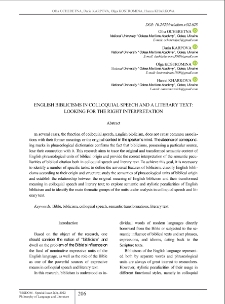Օբյեկտ
Վերնագիր: English Biblicisms in Colloquial Speech and a Literary Text: Looking for the Right Interpretation
Ամսագրի կամ հրապարակման վերնագիր:
Հրապարակման ամսաթիվ:
Հատոր:
Համար:
ISSN:
Համատեղ հեղինակները:
Խ․ Աբովյանի անվան հայկական պետական մանկավարժական համալսարան
Ծածկույթ:
Ամփոփում:
In several cases, the function of colloquial speech, English biblicism, does not cause common associa-tions with their former meanings or the original context in the speaker‟s mind. The absence of correspond-ing marks in phraseological dictionaries confirms the fact that biblicisms, possessing a particular source, lose their connection with it. This research aims to trace the original and transformed semantic content of English phraseological units of biblical origin and provide the correct interpretation of the semantic pecu-liarities of biblical citation both in colloquial speech and literary text. To achieve this goal, it is necessary to identify a number of specific tasks: to define the universal features of biblicism; classify English bibli-cisms according to their origin and structure; study the semantics of phraseological units of biblical origin and establish the relationship between the original meaning of English biblicism and their transformed meaning in colloquial speech and literary text; to explore semantic and stylistic peculiarities of English biblicism and to identify the main thematic groups of the units under analysis in colloquial speech and lit-erary text.
Հրատարակության վայրը:
Երևան
Հրատարակիչ:
Ձևաչափ:
Նույնացուցիչ:
oai:arar.sci.am:372096
Լեզու:
Օբյեկտի հավաքածուներ:
Վերջին անգամ ձևափոխված:
Oct 8, 2025
Մեր գրադարանում է սկսած:
Apr 1, 2024
Օբյեկտի բովանդակության հարվածների քանակ:
42
Օբյեկտի բոլոր հասանելի տարբերակները:
https://arar.sci.am/publication/401963
Ցույց տուր նկարագրությունը RDF ձևաչափով:
Ցույց տուր նկարագրությունը OAI-PMH ձևաչափով։
-
Իմաստություն=Wisdom=Мудрость
-
Իմաստություն, 2013, N 1
-
Իմաստություն, 2014, N 1 (2)
-
Իմաստություն, 2014, N 2 (3)
-
Իմաստություն, 2015, N 1 (4)
-
Wisdom, 2015, N 2 (5)
-
Wisdom, 2016, N 1 (6)
-
Wisdom, 2016, N 2 (7)
-
Wisdom, 2017, N 1 (8)
-
Wisdom, 2017, N 2 (9)
-
Wisdom, 2018, N 1 (10)
-
Wisdom, 2018, N 2 (11)
-
Wisdom, 2019, N 1 (12)
-
Wisdom, 2019, N 2 (13)
-
Wisdom, 2020, N 1 (14)
-
Wisdom, 2020, N 2 (15)
-
Wisdom, 2020, N 3 (16)
-
Wisdom, 2021, N 1 (17)
-
Wisdom, 2021, N 1 (1) Special issue
-
Wisdom, 2021, N 2 (18)
-
Wisdom, 2021, N 3 (19)
-
Wisdom, 2021, N 4 (20)
-
Wisdom, 2022, N 1 (21)
-
Wisdom, 2022, N 1 (2) Special issue
-
Wisdom, 2022, N 2 (22)
-
Wisdom, 2022, N 2 (3) Special issue
- Editorial board
- Contents
- Editor`s Foreword
- New Nakhichevan Dialect as an Element of the Armenian National Identity
- Philosophy of Dramatisation in the Context of Art Interaction in W. S. Maugham’s Novels
- Modern Ukrainian Grand Narrative: Prospects for Evolution
- Hate Language Produced by Indonesian Figures in Social Media: From Philosophical Perspectives
- Existential-Ontological Manifestations of Time in Khrimian Hayrik’s Essay “Time and Its Essence”
- Philosophical and Discursive Approaches to the Categorisation of Modal Meanings in Multimodal Texts
- The Novels by T. Hardy “Tess of the D’urbervilles” and “Loose” by Panas Myrnyi: Peculiarities of Stylistic Narration
- Problems of Studying the Verbal Semantics of Differential Languages in the Conditions of Bilingualism
- Philosophical Conception of Stable Verse Forms (Based on Yeghishe Charents’s Poetry Analysis)
- Synergetic Concepts “Chaos” and “Order” in Modern English Verbo-Creating Processes
- Paradigm of the Competence of Linguists in the Education System in the Context of Understanding the Philosophy of Language
- Nikolay Gogol and Raphael Patkanyan: The Philosophy of Horror
- Speech Aggression in Corporate Communication: The Gender Aspect in the Philosophy of Culture
- Camus’ Understanding of the Paradoxically Multidimensional Human Being
- US Presidents’ Political Speeches as a Means of Manipulation in 21st Century Society
- Provocation as a Tool of Language Influence
- Promise: Semantic, Communicative and Temporal Aspects
- Various Language-Philosophy Approaches to the Categorization of the Professional Oil Language in English and Russian
- The Role of Personality Type and Self-Determination of Students Majoring in Non-Philological Specialities While Building English for Professional Purposes Competence
- English Biblicisms in Colloquial Speech and a Literary Text: Looking for the Right Interpretation
- Philosophical and Ethical Problems of the Category “Life” in Michael Kozoris’s Novella “Chornohora Speaks”
- The Folk Medicine Concept in Vernacular English of the XIX Century
- Language-Philosophy Anomalies in the Framework of Free Indirect Speech: By the Example of Marina Tsvetaeva’s Prose
- Exploring the Origin of the Present-Day Human Self on the Fringes of Linguistic Advancement
- Perception of José Ortega y Gasset’s Works in Essays of Oksana Zabuzhko
- English Occult Discourse as a Cultural Phenomenon
-
Wisdom, 2022, N 3 (23)
-
Wisdom, 2022, N 3 (4) Special issue
-
Wisdom, 2022, N 4 (24)
-
Wisdom, 2023, N 1 (25)
-
Wisdom, 2023, N 2 (26)
-
Wisdom, 2023, N 3 (27)
-
Wisdom, 2023, N 4 (28)
-
Wisdom, 2024, N 1 (29)
-
Wisdom, 2024, N 2 (30)
-
Իմաստություն, 2013, N 1
| Հրատարակության անուն | Ամսաթիվ |
|---|---|
| Ocheretna, Olha, English Biblicisms in Colloquial Speech and a Literary Text: Looking for the Right Interpretation | Oct 8, 2025 |





